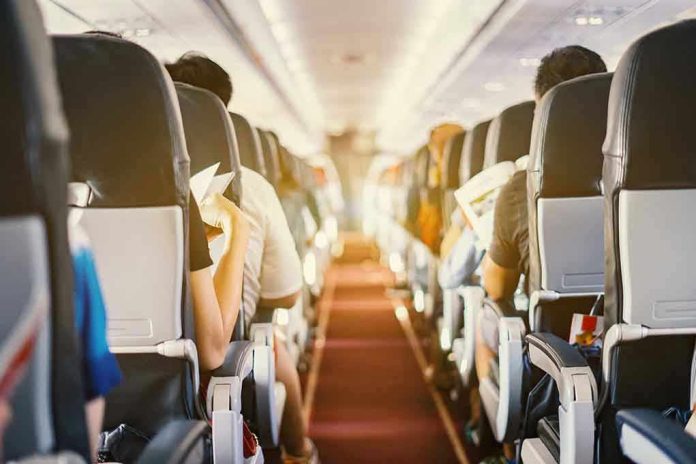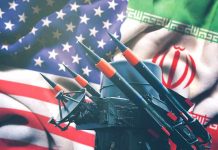
A violent brawl erupted between passengers disembarking an American Airlines flight in Miami, casting new doubts on the safety and orderliness of today’s skies as airline conflict and public frustration soar.
Story Snapshot
- Passengers engaged in a physical fight while exiting a Miami-bound American Airlines flight, with calls for police intervention caught on video.
- The incident highlights growing tensions, lax enforcement, and concerns about safety and order in American air travel.
- Media coverage and viral footage have intensified scrutiny of airline procedures and passenger conduct nationwide.
- The episode underscores the need for clear rules, strong authority, and respect for public order—values many feel have eroded in recent years.
Passenger Brawl on American Airlines Flight Raises Alarms Over Air Travel Safety
Passengers aboard an American Airlines flight at Miami International Airport became embroiled in a physical altercation while attempting to disembark. The conflict, reportedly sparked by disputes over exiting procedures, escalated rapidly, with at least one individual audibly demanding, “Call the police.” The entire episode was captured on video, quickly gaining traction on social media and igniting national debate about the state of airline safety and personal conduct in public spaces.
This highly visible incident occurred at one of the nation’s busiest airports, amplifying both its reach and its consequences. Miami International Airport, already known for operational challenges and high passenger volumes, has become the latest stage for what is an increasingly common spectacle: viral videos depicting unruly passengers and chaotic travel experiences. These incidents are no longer isolated but form part of a troubling trend, reflecting deeper issues in air travel management and public behavior.
Rising Tensions and Lapses in Enforcement Fuel Passenger Frustration
Passenger conflicts during both boarding and disembarkation have been on the rise, a trend fueled by overcrowded flights, frequent delays, and the lingering effects of post-pandemic stress. Airlines nationwide face criticism for their inconsistent enforcement of rules and unclear communication during high-pressure moments. Past high-profile episodes—such as the infamous United Airlines passenger removal—set the stage for public skepticism about how airlines manage conflict and protect passengers.
Miami’s latest incident mirrors many of these underlying problems. The sheer number of passengers, combined with operational stress, creates an environment ripe for confrontation. The response by airline staff and airport authorities is often scrutinized, with many questioning whether current protocols are sufficient to deter bad behavior or protect law-abiding travelers. Such incidents not only disrupt immediate travel plans but also undermine confidence in airline and airport security, raising questions about whether the system prioritizes order and safety.
Key Stakeholders: Passengers, Airlines, and Law Enforcement in the Spotlight
The primary parties in this latest altercation include frustrated passengers—motivated by urgency and perceived unfairness—alongside American Airlines, which is responsible for maintaining order and responding to post-incident challenges. Airport security and local law enforcement play a critical role in restoring peace and investigating the event, while the Federal Aviation Administration holds ultimate regulatory authority over airline safety protocols. Decision-making in such crises often falls to front-line staff, whose authority is frequently tested by unruly passengers unwilling to respect basic rules or the rights of others.
Power dynamics are on display as airline staff attempt to maintain order yet sometimes find their authority undermined by aggressive individuals. Law enforcement typically intervenes only when situations escalate beyond what airline personnel can safely manage. The outcome of such incidents can have lasting effects on all involved—from reputational damage to legal consequences and policy reviews. This latest Miami brawl is a clear example of how lax enforcement and a lack of respect for order can spiral into chaos, endangering everyone on board.
Ongoing Investigation and the Need for Stronger Policies
As of now, the incident remains under investigation by both airport authorities and American Airlines management. Despite the widespread attention—including viral video coverage and intense media scrutiny—no official statements have been released by the airline or Miami International Airport. The ongoing review may prompt disciplinary actions, legal consequences, or even broader policy changes affecting how airlines handle disembarkation and conflict management.
Short-term impacts include immediate disruptions for passengers and crew, possible arrests or legal consequences for those involved, and renewed scrutiny of airline protocols. In the longer term, this episode could drive airlines to revisit staff training and strengthen procedures for addressing passenger disputes. It may also accelerate public demand for transparency, accountability, and stronger authority in an industry many feel has become too passive in the face of growing disorder.
While the economic costs may include legal expenses and reputational damage, the social effects are arguably greater: eroding trust in the safety and civility of air travel. For conservative Americans who value law, order, and individual responsibility, events like this reinforce concerns about the breakdown of public standards and the need to restore discipline—not just in the skies, but across all public institutions.
Expert Perspectives Emphasize the Roots of Airline Disorder
Aviation safety experts point to overcrowding, operational delays, and inconsistent enforcement as root causes of rising passenger altercations. Academic studies suggest that clear communication and robust de-escalation training for airline staff can reduce the frequency and severity of such incidents. However, there is growing recognition that stricter penalties for unruly behavior—and stronger support for front-line staff—are necessary to restore respect and order. Coverage from major news outlets confirms the facts of the Miami incident and underscores its significance in the ongoing debate over safety, authority, and the direction of American air travel.




